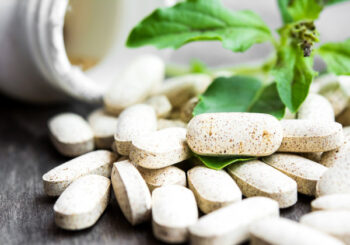Contributing writer for Wake Up World
While I do not recommend relying on supplements for your daily nutrition, depending on your state of health, there may be instances where you need one or more supplements to address a nutritional deficiency or ailment.
Some nutritional deficiencies are so widespread, thanks to soil depletion and reliance on processed foods, that just about everyone can benefit from supplementation. In this article, I will review 10 of the most popular nutritional supplements that may be helpful for many.
Ashwagandha
Ashwagandha is an adaptogenic herb, meaning it helps your body adapt to stress by balancing your immune system, metabolism and hormonal systems. The root contains the highest concentration of active ingredients that modulate hormones, including thyroid hormone, estrogen, progesterone and testosterone.
Naturally occurring steroids called withanolides in ashwagandha also suppress pathways responsible for several inflammation-based illnesses such as arthritis, asthma, hypertension, osteoporosis and cancer.
Ashwagandha also supports sexual and reproductive health in both men and women. In men, it helps boost testosterone levels, and has been shown to improve semen quality in infertile men.
In women, ashwagandha’s ability to rebalance hormones (including thyroid hormone, estrogen and progesterone) has been shown to improve polycystic ovary syndrome and relieve menopausal symptoms.
Ashwagandha also has natural pain reliever (analgesic) and rejuvenating properties, and can promote general health when used regularly. While some adaptogens are stimulants in disguise, this is not the case with ashwagandha. It can give your morning exercise routine a boost, and when taken prior to bed it can help you get a good night’s sleep as well.
Berberine
Berberine — a yellow-colored alkaloid compound found in several different plants, including European barberry, goldenseal, goldthread, Oregon grape and tree turmeric — has antibacterial, anti-inflammatory, antiproliferative, antidiarrheal, antineoplastic, antidiabetic and immune-enhancing1 properties.
It has a long history of use in traditional medicine, including traditional Chinese medicine, and many integrative health practitioners swear by berberine as a general health supplement due to its ability to address such a wide variety of maladies.2
For example, it’s effective against a wide range of bacteria, protozoa and fungi, and is commonly used to treat gastrointestinal issues, including traveler’s diarrhea and that from food poisoning. Having similar mechanisms of action as the drug metformin, berberine can also be used as an oral hypoglycemic for Type 2 diabetics.3 Other ailments berberine has been shown to protect against and/or treat include:4
| High blood pressure | Fatty liver disease |
| Obesity | Digestive issues |
| Neurological diseases such as Alzheimer’s and Parkinson’s | Cancer |
| Anxiety, depression and post-traumatic stress disorder (PTSD) |
Many of berberine’s health benefits5 have been linked to its ability to activate adenosine monophosphate-activated protein kinase (AMPK).6 AMPK is an enzyme inside your body’s cells. It’s sometimes referred to as a “metabolic master switch” because it plays an important role in regulating metabolism.7
Low AMPK has been linked to insulin resistance, mitochondrial dysfunction, obesity, neurodegeneration and chronic inflammation — all of which lay the groundwork for a wide variety of serious chronic diseases.
According to many studies, berberine is well-tolerated.8 However, it can interfere with some medications, including oral chemotherapy, high blood pressure medications, blood thinners, cholesterol medications, immunosuppressive drugs, and pharmaceutical diabetes treatments.
Women who are pregnant or breastfeeding should avoid berberine. Other side effects can include constipation, diarrhea, low blood sugar, nausea and vomiting.
Vitamin B12
Vitamin B12 (cobalamin) is known as “the energy vitamin.” Your body requires it for a variety of functions, including energy production, blood formation, DNA synthesis and myelin formation.
It also plays an important role in neurological function, and deficiency can culminate in a range of mental health symptoms, from irritability and depression to dementia and even psychosis. For more details, see “Vitamin B12 to Help Combat Mental Illness.”
Low B12 also increases inflammation and oxidative stress by raising homocysteine. High homocysteine, in turn, is associated with cardiovascular disease and decreased immune response. Vitamins B6, B9 (folate) and B12 break down homocysteine.9
Recent research10 suggests B12 may also be a key player in cellular regeneration, speeding up tissue repair. More specifically, the study found that vitamin B12 is a limiting factor for tissue repair. In other words, to optimize tissue regeneration, you need sufficient amounts of B12 in your system.
The two ways you become deficient are through a lack of vitamin B12 in your diet, or through your inability to absorb it from the food you eat. Vitamin B12 is present in natural form only in animal sources of food, which is one of the reasons I advise against a no-animal-food, vegan diet.
B12-rich foods include beef and beef liver (grass-fed beef is highly preferable to the grain-fed variety), lamb, snapper, venison, salmon, shrimp, scallops, organic pastured poultry and eggs.
Warning signs of B12 deficiency include brain fog, memory lapses, mood swings, apathy, fatigue, muscle weakness and tingling in the extremities. Unfortunately, B12 deficiency may not present itself for several years, so by the time you notice symptoms, you may be quite deficient.
When it comes to supplementation, your best alternatives include injectable B12 and sublingual drops or spray. Most oral supplements tend to be ineffective, as vitamin B12 is poorly absorbed.
You also want to make sure you’re taking methylcobalamin, not cyanocobalamin (which is the most commonly found B12). When taken sublingually (either by tablet or spray), it goes straight into your bloodstream.
If you take it as an oral supplement, you have to rely on a glycoprotein produced in your stomach called intrinsic factor, which binds to the B12 and shuttles it into the intestine to the end of the small intestine where it’s absorbed. As you get older, you lose the ability to produce intrinsic factor, making you more likely to suffer from B12 deficiency.
Other B Vitamins
The other B vitamins are also important, and if you eat a lot of processed food, you’re virtually guaranteed to be deficient in several of them. Case in point: in mid-October 2023, Moms Across America (MAA) tested 10 fast food brands for B vitamins,11 and none of them contained either B9 or B12. Levels of B3 (niacin) were also abysmal.
The recommended daily allowance (RDA) of niacin is 14 mg per day for women and 16 mg for men. To meet that RDA, a woman would need to consume 333 servings of Chick-fil-A chicken sandwiches (at a serving size of 210 grams) and a man would need to eat 380 servings.
Chipotle’s carnitas bowl with everything, which had the highest amount of B3, still requires you to eat eight servings if you’re a woman and nine servings if you’re a man, to meet your RDA of niacin. Personally, I believe a B complex is a good option for most people, as you really need all the B vitamins, not just one or two.
Niacinamide
I also recommend taking 50 mg of niacinamide (aka nicotinamide, a form of niacin or vitamin B3) two to three times a day, as it plays a vital role in producing energy in your mitochondria.
Without it, your mitochondria simply cannot make energy efficiently. Niacinamide is also a precursor to NAD+, which is also tightly correlated with total ATP production. NAD+ also acts as fuel for longevity proteins called sirtuins.
Because of its effects on energy production and NAD+, niacinamide can be useful in the prevention and/or treatment of a long list of chronic conditions, including obesity,12,13 insulin resistance and diabetes,14 neurodegeneration15 and neurological conditions such as Alzheimer’s and ischemic stroke,16,17 heart failure,18,19 leaky gut,20,21 glaucoma,22,23 declining testosterone levels,24,25 cancer,26,27 kidney disease,28 alcoholic- and nonalcoholic liver disease,29,30 and even COVID-19.31
Your NAD levels dramatically decline with age. It’s also used up by DNA repair enzymes and enzymes involved in inflammation and immunity, such that chronic inflammation, or acute illness in old age, can rapidly result in depletion. For more details, see “The Crucial Role of NAD+ in Optimal Health.”
Collagen
Collagen is the most common and abundant of your body’s proteins. One of its primary purposes is to provide structural scaffolding for your various tissues to allow them to stretch while still maintaining tissue integrity.
As a compound of essential amino acids, there’s only one way to get collagen. Your body can’t produce it, so you must obtain it through your diet. Historically, traditional diets provided ample collagen in the form of broth made from boiled chicken feet or beef bones. These are by far your best alternatives.
If you decide to use a collagen supplement, make sure your collagen supplement is certified “100% Organic” by the U.S. Department of Agriculture (USDA) to minimize the risk of contaminants associated with concentrated animal feeding operations (CAFOs).
Moreover, collagen supplements can be either unhydrolyzed (undenatured) or hydrolyzed (denatured). The processing that most collagen supplements undergo to become hydrolyzed can also result in questionable byproducts that are best avoided.
My personal preference is to use a less denatured (unhydrolyzed) organic collagen supplement, as it has a more balanced amino acid profile. That said, I still believe the natural approach is best. Making homemade bone broth using bones and connective tissue from grass fed, organically raised animals isn’t very complicated and will produce the best results. Another alternative is to take glycine, as nearly one-third of the amino acids in collagen is glycine.
Glycine helps reduce inflammation and oxidative damage, as it inhibits the consumption of nicotinamide adenine dinucleotide phosphate (NADPH). NADPH is used as a reductive reservoir of electrons to recharge antioxidants once they become oxidized.
Glycine also has cell-protective, and antistress effects,32 and has been shown to extend lifespan in animal studies and mitigate chronic disease and disability, thereby increasing healthspan. You need at least 12 grams of glycine daily for optimal collagen turnover, plus another 3 grams per day to form glutathione. So, a therapeutic dose of glycine would be around 15 grams, unless you’re also getting collagen from food or a supplement.
Creatine
Creatine is commonly used by athletes to improve performance, as it’s immediately used by your body to convert ADP to ATP and supply energy muscles need for contraction.
Creatine also helps provide energy to your brain and may improve cognitive performance. It also appears to have protective effects in cases of mild traumatic brain injury. Of the roughly 20 different formulations of creatine on the market, creatine monohydrate is the one that has been studied most frequently and therefore has the strongest evidence of health benefits.
Creatine appears to work by increasing proteins that create muscle fibers33 and raising insulin-like growth factor,34 a hormone that increases muscle mass. Data also suggest that creatine may help lower blood sugar levels.
It is important to choose creatine from a reputable manufacturer. Clinical trials that have lasted up to five years have reported no adverse effects in healthy individuals.35 However, it is important to stay within the recommended dose.
Some people find that creatine makes them feel bloated.36 Some people are sensitive to using creatine and feel bloated if they don’t drink enough water with the supplement. However, most of the time it goes away in just a few hours. Factors that affect bloating include how much water you drink, the intensity of your workout and your diet.
Keep in mind that it’s not guaranteed that you will build muscle from using creatine. Consider creating specific goals for using the supplement so you are not disappointed. If you’re a vegan or a vegetarian, you might consider using creatine to help protect brain health.
Omega-3
Omega-3 fats are essential for healthy cell membrane function, and higher omega-3 levels have been consistently linked to better health and longer life spans. The omega-3 fats EPA and DHA protect health and promotes longevity by:
| Thinning your blood, which discourages inappropriate clotting that can lead to a stroke or heart attack |
| Lowering serum triglyceride levels |
| Helping to lower blood pressure, in part by improving the health of the lining of your blood vessels so that they can relax better |
| Anti-inflammatory effects — For example, provided you have enough EPA and DHA in your membranes, when an inflammatory insult occurs, metabolites of the EPA and DHA — resolvins and protectins — will be synthesized. As their names imply, these metabolites help protect against and resolve inflammation. If you do not have sufficient omega-3, the inflammatory response persists longer and can become chronic |
| Helping the mitochondrial membrane process energy — Improving the fluidity and flexibility of the mitochondrial membrane allows enzymes and the other proteins embedded in the membrane to operate more smoothly |
| Adding structural stability to mitochondrial membranes — When loaded with omega-3, the membrane allows these agents to move freely, allowing everything to work as it should |
While most use fish oil to increase their omega-3 level, this isn’t the best choice, as most are synthetic ethyl esters, which are very different from the triglyceride and phospholipid forms of omega-3 found in sea food.
Ideally, you’d want to get most of your omega-3 from cold-water fatty fish like wild-caught Alaskan salmon, sardines, herring and mackerel, for example. If you opt for a supplement, krill oil, which delivers omega-3 primarily in the phospholipid form, makes it a superior choice to fish oil.
As for dosing, research37 has shown that an omega-3 index greater than 8% is associated with the lowest risk of death from heart disease while an index below 4% places you at the highest risk of heart disease-related mortality.
I recommend taking a maximum of 1 gram of omega-3 per day. Higher amounts could be risky, in my view, because EPA and DHA are both polyunsaturated fats (PUFAs) and, like linoleic acid (LA), are susceptible to oxidation and the production of dangerous aldehyde metabolites.
Magnesium
Magnesium is the fourth most abundant element in your body38 and one of the seven essential minerals we cannot live without.39 It’s involved in hundreds of biochemical reactions in the body,40 and deficiency can contribute to significant health problems.41
It is necessary for the healthy functioning of most cells, and especially your heart and muscles.42 Low levels can impede both cellular metabolic function and mitochondrial function.
According to one scientific review43,44 that included studies dating as far back as 1937, low magnesium may actually be the greatest predictor of heart disease. Research published in 201745 shows even subclinical magnesium deficiency can compromise cardiovascular health. My favorite form of magnesium is L-threonate, as it appears to make its way into your brain the best.
Vitamin D
Last but not least, vitamin D. Ideally, you would get most of your vitamin D from sensible sun exposure. Depending on where you live, this may not be possible however, so oral supplementation may be necessary for at least part of the year.
The ideal dose for most adults of normal weight is 6,000 IUs a day; 7,000 IUs if you’re overweight; and 8,000 IUs a day if you’re obese. At those dosages, most people can reach a minimum blood level of 40 ng/mL (100 nmol/L),46 which is the lower cutoff for sufficiency. Other research suggests you may need as much as 9,122 IUs per day to reach 40 ng/mL.47
Most definitely, the conventional claim that you only need a few hundred IUs per day — which is still touted by medical professionals in media48 — is completely inaccurate and is based on a statistical error49 that for some reason has never been officially corrected.
Your best bet is to get your vitamin D level tested twice a year. Based on the evaluation of healthy populations that get plenty of natural sun exposure, the optimal range for general health appears to be somewhere between 60 and 80 ng/mL (150 to 200 nmol/L).
Taking oral vitamin D together with vitamin K2 and magnesium is also recommended, as you need 244% more oral vitamin D if you’re not also taking magnesium and vitamin K2.50 In other words, if you take all three in combination, you need far less oral vitamin D in order to achieve a healthy vitamin D level.











